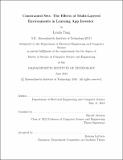| dc.contributor.advisor | Harold Abelson. | en_US |
| dc.contributor.author | Tang, Lynda (Lynda Y.) | en_US |
| dc.contributor.other | Massachusetts Institute of Technology. Department of Electrical Engineering and Computer Science. | en_US |
| dc.date.accessioned | 2018-12-18T19:46:38Z | |
| dc.date.available | 2018-12-18T19:46:38Z | |
| dc.date.copyright | 2018 | en_US |
| dc.date.issued | 2018 | en_US |
| dc.identifier.uri | http://hdl.handle.net/1721.1/119707 | |
| dc.description | Thesis: M. Eng., Massachusetts Institute of Technology, Department of Electrical Engineering and Computer Science, 2018. | en_US |
| dc.description | This electronic version was submitted by the student author. The certified thesis is available in the Institute Archives and Special Collections. | en_US |
| dc.description | Cataloged from student-submitted PDF version of thesis. | en_US |
| dc.description | Includes bibliographical references (pages 75-76). | en_US |
| dc.description.abstract | MIT App Inventor is a mobile application development platform that seeks to democratize the construction of mobile apps by making app development accessible to people with little to no experience with script-based programming. It uses block-based programming to introduce and teach programming concepts to its users. Users drag and drop functional and visual components onto their planned app in the screen editor, and construct the logic behind those components by using blocks in the block editor. In this thesis, we design and implement Constrained Sets, a system that allows instructors and developers to allow access to only a subset of App Inventor functionality by hiding component and block access. This system allows for the construction of multi-layered interfaces, which we then use to conduct an experiment that explores how novice App Inventor users learn App Inventor in different interface environments. Furthermore, we discuss and test the possibility of using a React based implementation of the App Inventor designer, and what implications that may have on creating more flexible user interfaces. | en_US |
| dc.description.statementofresponsibility | by Lynda Tang. | en_US |
| dc.format.extent | 76 pages | en_US |
| dc.language.iso | eng | en_US |
| dc.publisher | Massachusetts Institute of Technology | en_US |
| dc.rights | MIT theses are protected by copyright. They may be viewed, downloaded, or printed from this source but further reproduction or distribution in any format is prohibited without written permission. | en_US |
| dc.rights.uri | http://dspace.mit.edu/handle/1721.1/7582 | en_US |
| dc.subject | Electrical Engineering and Computer Science. | en_US |
| dc.title | Constrained sets : the effects of multi-layered environments in learning app inventor | en_US |
| dc.title.alternative | Effects of multi-layered environments in learning app inventor | en_US |
| dc.type | Thesis | en_US |
| dc.description.degree | M. Eng. | en_US |
| dc.contributor.department | Massachusetts Institute of Technology. Department of Electrical Engineering and Computer Science | |
| dc.identifier.oclc | 1078221698 | en_US |

